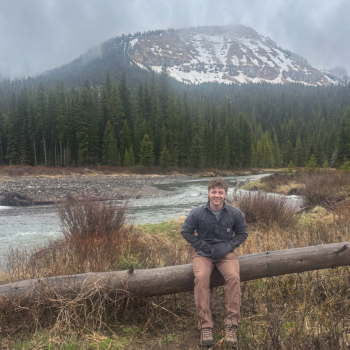From the classroom to Yellowstone National Park
July 16, 2025 - Gabriel Hoover
Gabriel Hoover is a rising JMC junior (IR '27) who participated in the Yellowstone Study Away program, led by JMC Profs. Sherman Garnett and Daniel Kramer, earlier this summer. Below he shares his reflections on the program and how it's shaped his perspectives on both domestic and global environmental issues.

What initially drew you to the program, and how does it connect to your academic goals at JMC?
I first learned about the program through a post on the JMC Instagram account, and it immediately caught my attention. As an International Relations major with a STEPPs minor, I’m especially interested in environmental issues from both a domestic and global standpoint, and as such, I felt that this opportunity aligned with what I wanted to do at JMC. Studying these topics in-depth and firsthand at Yellowstone, America’s first national park, felt like a perfect opportunity.
The program directly aligned with the goals of my STEPPs minor, which focuses on sustainability, technology, environment and public policy. We explored issues like human-wildlife conflict, invasive species, federal conservation directives and land management strategies, all of which are crucial environmental policies. Although a lot was based on domestic management and environmental issues, many of the topics could be expanded globally. As such, I wrote my paper for the course based on one of the topics we discussed in Yellowstone (navigating human-wildlife conflict) and expanded it to different global perspectives. Doing this not only supported my academic goals within JMC but also broadened my perspective on how environmental policy relates internationally.

Were there any elements of the experience that were particularly impactful, interesting or surprising for you?
First of all, the entirety of the experience was especially impactful for me. It’s hard to pinpoint one or several things that stood out to me, because the whole thing was interesting. I think, mainly, however, the passion of the ranchers, biologists, advocates, etc., that we had discussions with was very moving. How they spoke about their work, whether I agreed with them or not, was filled with so many intense emotions and moving anecdotes that you couldn’t help but be interested in what they talked about. I feel that in that way, the professors lined up a great group of presenters for us, ones that made the trip all the more powerful.
Any major themes or takeaways that you’re still exploring or thinking about now that the program has wrapped up?
Since the program wrapped up, I’ve been thinking of two key takeaways. Firstly, I’ve been looking more in-depth into how different states and societies navigate human-wildlife conflict. I believe that diversity in perspectives when dealing with human-wildlife conflict is crucial. As such, it is essential to look across borders and attempt to develop and implement strategies to manage conflict on a case-by-case basis rather than one overarching strategy that isn’t effective in certain communities.
Another theme I’ve been thinking about is how, in a polarized political state like the one we are in now, we can promote bipartisan policy that supports conservation and wildlife management efforts. I think this is relevant now, given the current administration’s lack of support for conservation efforts.

How was the “study away” experience different from your traditional JMC classes at Case?
Mainly, we were physically out in the field, directly engaging with the issues I often only discuss in the classroom. For me, learning about human-wildlife conflict in East Lansing isn’t nearly as impactful as actually being out where these issues take place and having a conversation with individuals who confront these challenges on a daily basis.
As someone who doesn’t necessarily adore conventional lecture and classroom settings, the opportunity to go out and explore, observe and learn through hands-on experiences was both different and valuable. This less rigid class structure provided me the ability to explore wilderness not typically found in a city like East Lansing and gave me the opportunity to speak with local experts, which provided major differences in the variety of perspectives we normally encounter.
In my opinion, in a typical class, you’re usually exposed to the professor’s viewpoint and maybe a few differing student opinions. On this trip, I was introduced to a wide range of perspectives, each of which had its own background, expertise and lived experience. Even encounters I had with locals who weren’t part of the program added depth to my learning through random and meaningful conversations that I wouldn’t otherwise have in a typical course.
Has participating in the program influenced how you’re thinking about your path post-graduation?
Absolutely. Participating in the program has broadened my perspective on what I can do with my degree. I used to think so narrowly about my post-graduation path, mainly on the prospect of law school and a traditional legal career. But after meeting so many inspiring people out west and seeing the meaningful, passionate work they’re doing, especially in environmental fields, I’ve started to rethink my goals. The experience has definitely pushed me to explore more environmentally focused paths and consider how I can align my interests with a career that makes a tangible impact. Not to mention having the ability to live and work in such a beautiful and ecologically diverse environment.

